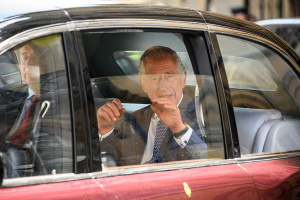Number of colleges with heavy restrictions on free speech rises

The number of colleges and universities that have significant restrictions on free speech has increased, according to a new report from a free speech advocacy group.
The Foundation for Individual Rights and Expression, formerly the Foundation for Individual Rights in Education, has released a new report on the state of free speech on college campuses, titled “Spotlight on Speech Codes 2023.”
The organization ranked nearly 500 U.S. colleges on the basis of a light system, with “green light” colleges having policies that “do not seriously imperil free expression,” “yellow light” colleges having “vague regulations on expression,” and “red light” colleges having “policies that clearly and substantially restrict free speech.”
According to the FIRE report, for the first time in 15 years, the number of colleges with the worst free speech rating has increased, as 12 colleges went from having a “yellow light” status to a “red light” status.
Laura Beltz, director of policy reform for FIRE and author of the report, told The Christian Post that the increase in “red light” college campuses came “for a variety of reasons.”
“Five schools in Minnesota were downgraded because the Minnesota State Colleges and Universities system adopted a new, restrictive harassment policy. A few other schools adopted policies with restrictions on subjectively hateful or biased expression,” said Beltz.
“Overall, it seems like policies that regulate how students express themselves, like protest policies, are improving, but regulations on what they are saying — the content or viewpoint of that expression — are worsening,” she added.
Although this year’s report showed an increase in college campuses with greater restrictions on speech, Beltz noted that there were still many positive developments that have occurred in recent years.
“A few factors contributed here — efforts of free speech groups like FIRE have exposed these policies, so the schools with those most obviously clear and substantial restrictions on speech faced public pressure to revise them,” Beltz told CP. “In the past decade, about half of states across the country have explicitly banned ‘free speech zone’ policies that restrict expressive activities to small, out-of-the-way areas on campus, resulting in improved policies across the board. Further, litigation from groups like FIRE has resulted in improved policies.”
For its report, FIRE examined the official free speech policies of 486 schools, divided between 375 four-year public colleges and 111 private colleges.
The report found that 324 schools received a “yellow light” status, while 94 earned a “red light” status, an “all-time high” of 60 earned a “green light” status and eight schools received a “warning,” which meant that they “do not promise students free speech rights at all.”
The report also revealed that private schools tended to rank worse than public schools, with 37.8% of private institutions getting a “red light” designation versus 13.9% of public institutions. Additionally, while 14.9% of public institutions got a “green light” designation, only 3.6% of private institutions were ranked the same.
“Private schools aren’t bound by the First Amendment like public schools are, but the vast majority of private schools across the country do promise their students free speech rights in their official written materials, so they must be held to those promises,” Beltz told CP.
“Too many private schools want to have it both ways — they make lofty statements about protecting free speech, inquiry, and debate in their handbooks and in speeches from leadership, but they infringe on free speech rights in policy and in practice.”
Debates over free speech on college campuses have been the subject of much controversy and litigation in recent years, with courts often ruling against strict campus speech codes.
In April, for example, a three-judge panel of the U.S. Court of Appeals for the 11th Circuit issued a unanimous ruling against the University of Central Florida’s policy of banning the broadly defined “discriminatory harassment.” Circuit Judge Kevin Newsom authored the panel opinion, concluding that “the discriminatory-harassment policy likely violates the First Amendment on the grounds that it is an overbroad and content- and viewpoint-based regulation of constitutionally protected expression.”





























